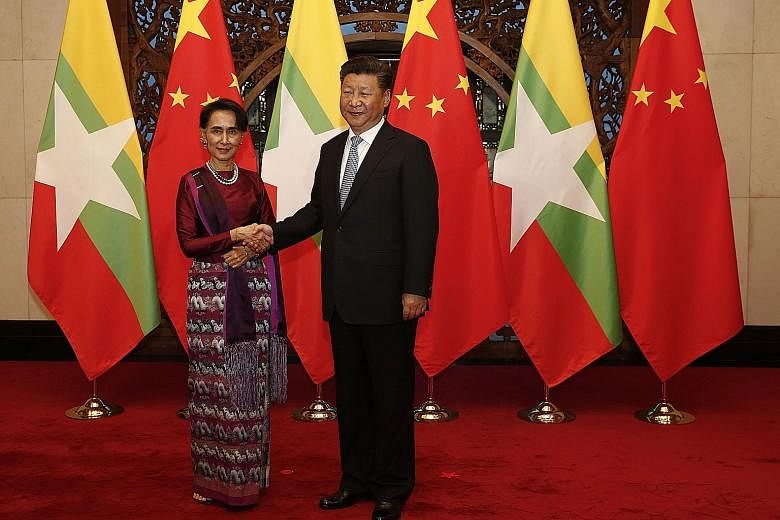China and Myanmar have pledged to cooperate on maintaining peace in their troubled border region, signalling a mutual desire to repair ties after a recent blip.
"Myanmar wishes to work with China to maintain stability in our border region," said de facto Myanmar leader Aung San Suu Kyi yesterday in her meeting with Chinese President Xi Jinping.
"(We) will not allow anything that will affect friendly ties with our neighbour to happen," she added.
Mr Xi also indicated that China will support Myanmar in resolving conflicts between the government and armed rebels in northern Myanmar. "China wishes to continue to play a constructive role in the peace process in Myanmar, and cooperate (with Myanmar) to maintain peace and stability on the China-Myanmar border," said Mr Xi.
This is Ms Suu Kyi's first official visit to China since assuming the post of state counsellor in the new popularly-elected civilian government in April, which both sides hope will set a new tone for bilateral ties.
The China-Myanmar border spans 2,210 km, and it is in China's interest to help Myanmar maintain peace in the region, said analysts.
Stability there will improve trade and connectivity, directly benefiting people on both sides, said Myanmar expert Fan Hongwei from Xiamen University.
On the flip side, if war breaks out at the border, China will be the first to be hit by tens of thousands of refugees spilling into south-western Yunnan, something it wants to avoid, he added.
Myanmar is also key to China's ambitious plan to link its south-west to the Indian Ocean as part of its Silk Road initiative, said Dr Du Jifeng, a Sino-Myanmar expert at the Chinese Academy of Social Sciences.
"Even though the new government adopts a different ideology from China, which is that of Western reforms, it does not change its geopolitical significance to China," said Dr Du.
Given that China has invested heavily in Myanmar mega-projects such as the US$3.6 billion (S$4.8 billion) Myitsone dam project, it is "not realistic" to expect China to give up on its economic interests in the country, experts told The Straits Times.
The country is equally important to Myanmar, not only in exerting its influence over the armed rebels along the borders, but also in helping the fledgling government build its economy.
China is Myanmar's largest trading partner and a major investor with committed investments of US$25.4 billion as at end-July, which are nearly 40 per cent of all foreign investments in the country.
While the mineral-rich country has relied on Beijing for economic and diplomatic support during decades of Western sanctions under military rule, the warm ties have taken a hit since the previous government began democratic reforms in 2010 and appeared to have leaned away from China towards the West.
While this visit signals a good start in better ties, Prof Fan cautioned that the challenge will be in executing the high-level ideas on the ground, ensuring that the people actually benefit from any possible new forms of cooperation.
Dr Du pointed out that while both sides are keen to build closer and warmer ties despite outstanding problems like the suspended Myitsone dam project, Myanmar may be constrained by domestic and international considerations.
Public opinion within the country and its relationship with the United States could introduce uncertainties to Sino-Myanmar ties, he said.
As this is the first meeting between the leaders, Prof Fan said that more time is needed for them to build stronger mutual trust.
"It's still too early to tell. But we can see that it's off to a good start."

